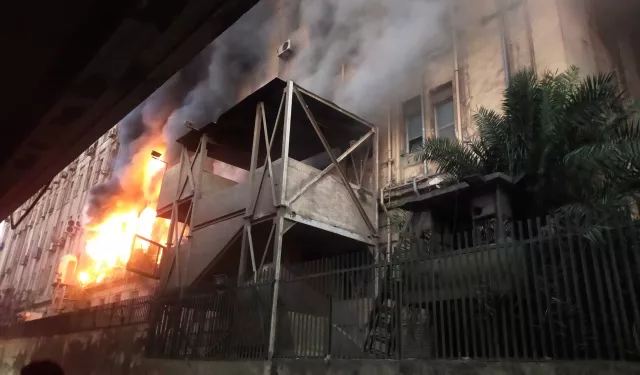A digital rights group has called for a sweeping review of Egypt’s telecommunications infrastructure following a fire at the Ramses central exchange that knocked out internet services across the country.
The blaze, which erupted on Monday night on the seventh floor of the 10-story building, has severely disrupted digital services across the country and sparked intense parliamentary debate regarding national infrastructure and governmental accountability.
The Ministry of Health reported 27 injuries, primarily due to smoke inhalation, and confirmed four fatalities.
In a report released on Tuesday, Masaar, a local nonprofit advocating for digital freedoms, warned of Egypt’s “fragile” digital infrastructure and called on authorities to decentralize network nodes, strengthen backup systems, and adopt alternative routes to ensure service continuity in emergencies.
The report came as legal researcher and lawyer Hassan Elazhary attributed the widespread outage caused by the Ramses fire as “a human error warranting compensation,” arguing the National Telecom Regulatory Authority (NTRA) should share liability with internet service providers (ISPs).
“This wasn’t an act of God. It’s a failure of planning and oversight,” Elazhary told Al Manassa, adding that the blackout impacted essential services and daily life.
The exchange's centrality
Masaar’s report cited data from the Georgia Tech-affiliated IODA and Cloudflare Radar to show the extent of the outage. The data revealed a sharp drop in internet traffic nationwide, suggesting that the fire had disabled critical components of the network.
The report's findings reveal Ramses served as a critical single point of failure, with numerous Internet Service Providers (ISPs) and mobile operators relying on it as a central node. Masaar noted that the slow and inconsistent service recovery bolsters this theory, suggesting the fire's damage likely impacted core infrastructure or crucial interconnection pathways.
Communications Minister Amr Talaat had confirmed Monday evening that the Ramses exchange was “no longer operational.”
According to IODA traffic maps cited in the report, the outage hit hardest in Cairo, Giza, and Alexandria, and extended across the Delta, Upper Egypt, and Sinai.
Criticizing the government's lack of robust emergency protocols, the report warned of recurring internet disruptions unless significant investment fortifies infrastructure resilience against natural disasters, technical failures, and digital attacks.
This recent outage alone paralyzed critical services, from electronic payments and airline operations to subsidized bread systems and ATM withdrawals across multiple regions.
Legal accountability and compensation debate
Elazhary argued that the blackout is not a force majeure event but a result of human negligence, giving users grounds to seek damages under civil law.
Speaking to Al Manassa, he asserted that the NTRA and ISPs share legal responsibility, as the outage caused not only service interruptions but also economic harm, blocked emergency lines, suspended trading at the stock exchange, and disrupted banking operations.
The Egyptian law lacks clear guidelines for user compensation in telecom disruptions, he noted, urging victims to file civil claims based on documented damages.
“The burden of proof lies with the affected individuals,” Elazhary said. “They don’t need to prove the cause of the outage, only the extent of their loss.”
